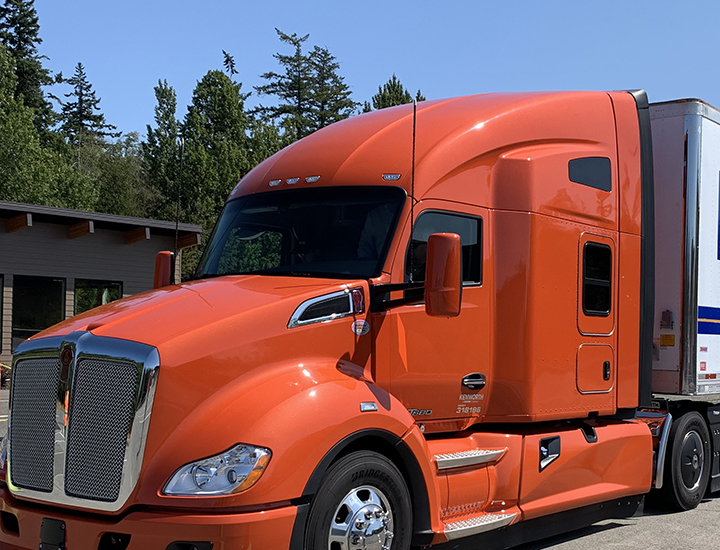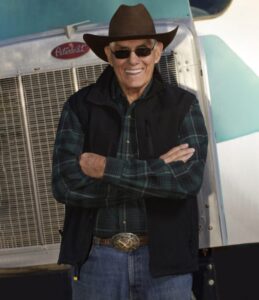BELLEVUE, Wash. — The COVID-19 crisis continues to impact the trucking industry during 2020, and PACCAR’s second-quarter figures show that even OEM giants are not immune to the pandemic’s impact on the economy.
The company, which produces Kenworth, Peterbilt and DAF trucks, earned net income of $147.7 million (43 cents per diluted share) in the second quarter of 2020, compared to $619.7 million ($1.78 per diluted share) earned in the same period of 2019. Second-quarter net sales and financial services revenues were $3.06 billion, compared to $6.63 billion achieved in the second quarter of last year.
Despite the significant drops, CEO Preston Feight describes the quarter as “good,” in light of the COVID-19 pandemic.
“PACCAR closed its factories for five weeks at the beginning of the quarter and has gradually resumed production while enhancing operating processes and procedures for employee health and well-being, manufacturing efficiency and customer satisfaction. I am very proud of our outstanding employees who delivered excellent production and distribution performance while enhancing PACCAR’s rigorous health and safety standards,” he said.
“PACCAR’s truck production and PACCAR Parts’ aftermarket sales steadily increased as the quarter progressed,” he continued. “PACCAR’s quarterly profits are a direct result of its proven business model — premium trucks and transportation solutions, flexible manufacturing processes, a strong balance sheet, and rigorous cost control while maintaining R&D and capital investments that drive long-term growth.”
PACCAR reported first half net income of $507.1 million ($1.46 per diluted share), compared to $1.25 billion ($3.59 per diluted share) earned in the first six months of 2019. Net sales and financial services revenues for the first six months of 2020 were $8.22 billion, compared to $13.12 billion achieved last year.
“PACCAR is in excellent financial position, with manufacturing cash and marketable securities of $4.17 billion at June 30, 2020 and bank facilities of $3.0 billion,” shared Mark Pigott, executive chairman. The company has credit ratings of A+/A1.
PACCAR’s board of directors declared a regular quarterly cash dividend of 32 cents per share, payable on Sept. 1, 2020, to stockholders of record at the close of business on Aug. 11, 2020.
Highlights of PACCAR’s financial results for the second quarter of 2020 include:
- Net sales and revenues of $3.06 billion;
- Net income of $147.7 million;
- Global truck deliveries of 18,100 units;
- PACCAR Parts revenues of $823.7 million;
- PACCAR Parts pre-tax income of $151.9 million;
- Financial Services pre-tax income of $55.5 million;
- Manufacturing cash and marketable securities of $4.17 billion;
- Cash generated from operations of $934.9 million; and
- Stockholders’ equity of $9.78 billion.
Highlights of PACCAR’s financial results for the first six months of 2020 include:
- Net sales and revenues of $8.22 billion;
- Net income of $507.1 million;
- Capital investments of $308.8 million and R&D expenses of $137.5 million;
- Financial Services pre-tax income of $103.8 million;
- Cash generated from operations of $1.36 billion; and
- Medium-term note issuances of $1.33 billion.
Global Truck Markets
Class 8 truck industry retail sales in the U.S. and Canada are estimated to be in a range of 160,000 to 190,000 trucks in 2020, though the market size and economy could be impacted if there was a resurgence of COVID-19. Peterbilt and Kenworth achieved U.S. and Canada Class 8 truck retail sales market share of 29.6% through June this year, compared to 29.1% during the same period last year.
“The U.S. and Canada Class 8 truck market is rebounding as state and local economies re-open,” said Mike Dozier, senior vice president. “Customers benefited from lower fuel costs, and many sectors experienced higher freight volumes and improved freight pricing as the quarter progressed. Class 8 truck industry orders in June were 28% higher than June last year.”
The European and South American truck markets look to be “bouncing back,” according to DAF executives.
“Customer demand for fuel-efficient DAF XF, CF and LF trucks bounced back in May and June as the European economies improved,” said Harry Wolters, DAF president.
European truck industry registrations in the above 16-ton market are estimated to be in a range of 190,000 to 220,000 vehicles this year. The South American above 16-ton truck market is projected to be in a range of 60,000 to 80,000 trucks in 2020.
“Customers appreciate the durability and reliability of DAF trucks in Brazil, which is one of the most demanding operating environments in the world,” said Mike Kuester, assistant vice president of South America. “DAF achieved a record 9.1% market share in the Brazil above 40-ton truck segment in the first half of this year.”
PACCAR Parts
PACCAR Parts achieved quarterly revenues of $823.7 million in the second quarter of 2020, compared to $1.03 billion achieved in the same period last year. Second quarter 2020 pre-tax profit was $151.9 million, compared to $210.6 million achieved in the second quarter of 2019. PACCAR Parts first half 2020 revenues were $1.82 billion, compared to $2.03 billion in the same period last year. PACCAR Parts achieved pre-tax profit of $366.6 million in the first six months of 2020, compared to $418.2 million earned in the first six months of 2019.
“Some customers deferred vehicle maintenance during the quarter, which impacted parts purchases. The stronger economy and higher truck traffic in June increased demand for aftermarket services,” said David Danforth, PACCAR vice president and PACCAR Parts general manager.
“PACCAR Parts has invested in its e-commerce platform for many years, which benefits our customers and dealers. PACCAR Parts’ global e-commerce retail sales increased 20% in the first half of 2020 compared to the same period last year,” said Jim Walenczak, PACCAR Parts assistant general manager.
PACCAR continues to add global distribution capacity to deliver industry-leading aftermarket parts availability to its customers. PACCAR’s new 250,000 square-foot distribution center in Las Vegas and new 160,000 square-foot distribution center in Ponta Grossa, Brazil opened during the second quarter.
Financial Services
PACCAR Financial Services (PFS) has a portfolio of 202,000 trucks and trailers, with total assets of $15.05 billion. PACCAR Leasing (PacLease), a full-service truck leasing company, is included in this segment.
Second quarter PFS pre-tax income in 2020 was $55.5 million compared to $80.3 million earned in the second quarter of 2019. Second quarter 2020 revenues were $360.3 million compared to $361.4 million achieved in the same quarter of 2019.
For the first six months of 2020, PFS earned pre-tax income of $103.8 million compared to $164.3 million last year. First-half 2020 revenues were $744.0 million compared with $710.9 million for the same period a year ago.
“PFS’ portfolio performed well during the second quarter of 2020,” said Todd Hubbard, PACCAR vice president. “The used truck market is experiencing lower vehicle resale values. PACCAR Financial is investing in worldwide used truck retail centers to sell an increased number of used trucks at retail prices, which enhances used truck sales margins. PFS recently opened used truck centers in Denton, Texas, and Prague, Czech Republic, and plans to open a used truck facility in Madrid, Spain.”
“PACCAR’s excellent balance sheet, complemented by its A+/A1 credit ratings, enables PFS to offer competitive retail financing to Kenworth, Peterbilt and DAF dealers and customers in 26 countries on four continents,” said Craig Gryniewicz, president of PACCAR Financial Corp. “We have excellent access to the commercial paper and medium-term note markets, allowing PFS to profitably support the sale of PACCAR trucks.”
The Trucker News Staff produces engaging content for not only TheTrucker.com, but also The Trucker Newspaper, which has been serving the trucking industry for more than 30 years. With a focus on drivers, the Trucker News Staff aims to provide relevant, objective content pertaining to the trucking segment of the transportation industry. The Trucker News Staff is based in Little Rock, Arkansas.












As someone who’s experienced driving a brand new class 8 truck with a paccar these trucks are not going to have any value once their warranty is expired. It’s frustrating to have a truck go into limp mode after the entire motor had been replaced after just 40,000 miles. Sales aren’t down because of the pandemic…sales are down because of reputation.